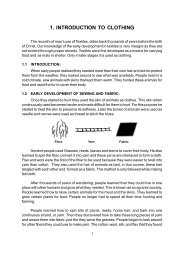- Page 1 and 2: BOTANY HIGHER SECONDARY - FIRST YEA
- Page 3 and 4: PREFACE We are passing through an "
- Page 5 and 6: Unit 5 : Plant Physiology (30 hours
- Page 7 and 8: 5. Physiology Experiments 5..1 Tran
- Page 9 and 10: III. PLANT MORPHOLOGY .............
- Page 11 and 12: Diversity in living organisms I. BI
- Page 13 and 14: the fossil records which form the b
- Page 15 and 16: Other colorless forms ingest small
- Page 17 and 18: 2. Their mode of nutrition is heter
- Page 19 and 20: Difficulties in classification Sinc
- Page 21 and 22: Introduction 2. Salient Features of
- Page 23: Structure of a virus A virus is com
- Page 27 and 28: the Diptheria bacillus which is det
- Page 29 and 30: It has created panic among the peop
- Page 31 and 32: Two Marks 1. Justify: Viruses are b
- Page 33 and 34: C. Tetracocci: Cells divide in two
- Page 35 and 36: Acetobacteria and Lactobacillus are
- Page 37 and 38: 2. Transduction : Donor DNA is carr
- Page 39 and 40: 2. Vinegar Vinegar (Acetic acid) is
- Page 41 and 42: 2.3 Fungi Conventionally Fungi have
- Page 43 and 44: species and suffers harm from the p
- Page 45 and 46: Mucor Rhizopus Sporangium Spores Sp
- Page 47 and 48: organisms play an important role in
- Page 49 and 50: 2.3.1 Mucor Division : Eumycota Sub
- Page 51 and 52: As a consequence, the sporangium bu
- Page 53 and 54: Fig.1.20 Life-Cycle of Mucor SELF E
- Page 55 and 56: 2.4 Algae Salient Features Algae ar
- Page 57 and 58: The yellow, orange or red coloured
- Page 59 and 60: 1. Pigmentation 2. Reserve food 3.
- Page 61 and 62: It is used in sound and fire proof
- Page 63 and 64: 2.4.1 Spirogyra Class : Chlorophyce
- Page 65 and 66: (c) By aplanospores During unfavour
- Page 67 and 68: Fig.1.28 Schematic representation o
- Page 69 and 70: 2.5 Bryophytes There are fossil rec
- Page 71 and 72: the dominant generation in the top
- Page 73 and 74: 2.5.1 Riccia Class : Hepaticae Orde
- Page 75 and 76:
Chlorophyllous tissue The dorsal re
- Page 77 and 78:
Structure of mature archegonium Mat
- Page 79 and 80:
to form a diploid zygote which grow
- Page 81 and 82:
2.6. Pteridophytes This division in
- Page 83 and 84:
Ferns represent a more specialized
- Page 85 and 86:
2.6.1 Nephrolepsis Division : Trach
- Page 87 and 88:
The vascular cylinder is diarch and
- Page 89 and 90:
Each mature archegonium is differen
- Page 91 and 92:
2.7 Spermatophytes (Gymnosperms) Th
- Page 93 and 94:
5. The sporophyte bears two types o
- Page 95 and 96:
SELF EVALUATION One Mark Fill in th
- Page 97 and 98:
Normal roots: The long-lived primar
- Page 99 and 100:
lignified and pitted cell walls. Th
- Page 101 and 102:
The vascular bundles are arranged i
- Page 103 and 104:
Reproduction : Cycas reproduces by
- Page 105 and 106:
(anemophyllous). Further developmen
- Page 107 and 108:
Fertilization : The fusion of male
- Page 109 and 110:
II. CELL BIOLOGY 1. The Cell - Basi
- Page 111 and 112:
Table 2.1 Differences between plant
- Page 113 and 114:
2. Cell Theory In the year (1839) S
- Page 115 and 116:
3. Prokaryotic and Eukaryotic Cell
- Page 117 and 118:
Surrounding the DNA in the darker r
- Page 119 and 120:
and size of the chromosomes are the
- Page 121 and 122:
air and that is the reason why the
- Page 123 and 124:
5.Cell Wall The cells of all plants
- Page 125 and 126:
wall is very strongly anisotropic a
- Page 127 and 128:
SELF EVALUATION One Mark Choose the
- Page 129 and 130:
Lipids The lipid molecules form a c
- Page 131 and 132:
The rate of diffusion is directly p
- Page 133 and 134:
itself to the other binding site of
- Page 135 and 136:
Five Marks 1. List the functions of
- Page 137 and 138:
Smooth ER This type of ER does not
- Page 139 and 140:
It is formed by a stack of flattene
- Page 141 and 142:
Mitochondria A Mitochondrion is als
- Page 143 and 144:
Stroma, a semi fluid, colourless, c
- Page 145 and 146:
Self Evaluation One Mark Choose the
- Page 147 and 148:
In plants, active mitotic cell divi
- Page 149 and 150:
Cytokinesis The division of the cyt
- Page 151 and 152:
3. Anaphase I 4. Telophase I Propha
- Page 153 and 154:
Consequently at each pole only half
- Page 155 and 156:
III. PLANT MORPHOLOGY 1. Root, Stem
- Page 157 and 158:
4. Zone of cell differentiation : (
- Page 159 and 160:
2. Respiratory or breathing roots I
- Page 161 and 162:
Vanda Tinospora Leaf Photosynthetic
- Page 163 and 164:
Phylloclade: These are green, flatt
- Page 165 and 166:
Scale leaf Ginger Bud Potato Eye sp
- Page 167 and 168:
VENATION Reticulate Parallel Pinnat
- Page 169 and 170:
1.Unipinnate: In Digitate - Bombax
- Page 171 and 172:
5. Pitcher In the pitcher plant (Ne
- Page 173 and 174:
2. Inflorescence The reproductive o
- Page 175 and 176:
Simple Raceme This is a very simple
- Page 177 and 178:
is called involucre of bracts from
- Page 179 and 180:
Simple Cyme The stem or the axil of
- Page 181 and 182:
IV. Special Type of Inflorescence T
- Page 183 and 184:
3. Flowers, Fruits and Seeds Struct
- Page 185 and 186:
Parts of a flower A typical flower
- Page 187 and 188:
coloured and highly developed, whic
- Page 189 and 190:
II. Filmbriate: Petals fringed with
- Page 191 and 192:
Valvate Twisted Descendingly Imbric
- Page 193 and 194:
iii. Gynandrous: Stamens adhere to
- Page 195 and 196:
1. Axile Placentation This type of
- Page 197 and 198:
iii. Asymmetric: A flower which can
- Page 199 and 200:
In these fruits either the entire p
- Page 201 and 202:
2. Cremocarp: Fruit is produced fro
- Page 203 and 204:
the flowers are sterile and seeds a
- Page 205 and 206:
maize grain is yellow in colour and
- Page 207 and 208:
Fill in the blanks 1. A special lea
- Page 209 and 210:
IV. GENETICS 1. Concept of Heredity
- Page 211 and 212:
this concept the progeny of a black
- Page 213 and 214:
2. Mendel's Laws of Inheritance Int
- Page 215 and 216:
1. It is a naturally self-fertilizi
- Page 217 and 218:
Monohybrid Cross (Experiments with
- Page 219 and 220:
Dihybrid Cross (Cross involving two
- Page 221 and 222:
characters that appear in the F 1 h
- Page 223 and 224:
Fill in the blanks 1. The pairs of
- Page 225 and 226:
contained as a sequence of nucleoti
- Page 227 and 228:
Physical and Chemical Basis of Here
- Page 229 and 230:
other and not the alleles. In Mirab
- Page 231 and 232:
Epistasis can be of the following t
- Page 233 and 234:
White Green P WWYY X wwyy Gametes W
- Page 235 and 236:
SELF EVALUATION One Mark Choose the
















